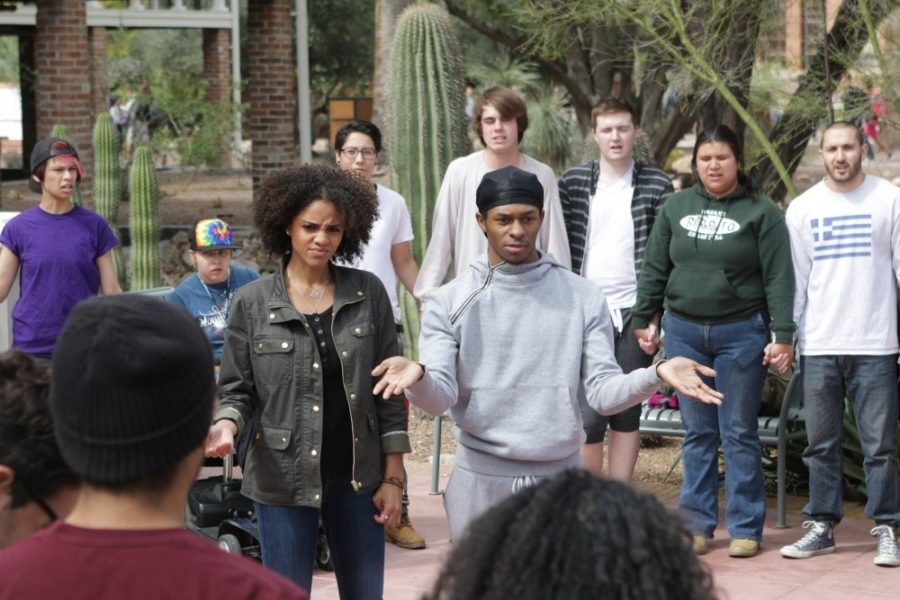Whether it’s graduate students protesting the president’s latest decision, faculty arguing for more pay or campus preachers insisting “you deserve rape,” the UA is no stranger to activism and free expression.
As a student attending a public university, you will see not only the UA community come together to hold marches, protests, walk-outs and other rallies, but you’ll see community members and activist groups of all kinds utilizing the campus soapbox.
Want to know what speech is considered protected and what is considered disruptive? Here’s the breakdown of your free speech rights at the UA .
The campus use policy details the universities’ First Amendment guidelines and procedures:
“The university is committed to protecting the free speech rights of students, faculty, staff and invited guests. The purpose of this policy is to respect the campus community’s rights to free speech and expressive activity within public and designated public forums, while preserving public health, safety and welfare, the normal business uses of the campus, and the rights of others to legitimately use and enjoy the campus.”
Kathy Adams Riester, associate dean of students, said public higher education institutions are really meant to be a marketplace of ideas.
While the UA protects and encourages free expression, the primary purpose of the institution is to provide higher education.
In order to prevent the disruption of the university’s educational and business functions, Reister said the university may place restrictions and regulate the place, manner and time of free speech occurring on campus.
Currently the UA doesn’t allow sound amplification outside the times of 12-1 p.m. and 5-7p.m., Monday through Friday.
Spaces and places on the UA’s campus and properties are also qualified as everything from designated public forums to non-public forums, meaning they serve different purposes and allow different things to occur.
For instance, public sidewalks which are owned by the city or state and open areas like the UA Mall are open public forums, while the Student Union Memorial Center and classrooms are considered non-public forums because they serve educational and business purposes.
Riester said when it comes to regulating speech the university primarily looks at whether speech is disruptive or not to the surrounding areas.
“Our goal is not to stop speech but to make sure one person’s speech is not disrupting some other activity, another person’s speech or university business,” Riester said.
Riester said if someone is amplifying sound so loud outside a building that the students inside can hear, they will typically ask that person to relocate to a different location on campus.
Another example Riester gave of disruptive behavior or speech is if someone is speaking at the mouth of the SUMC canyon and the crowd becomes so big it blocks ingress and egress.
In the past the university has seen a lot of complaints concerning campus preachers, their signs and their speech.
Riester said that there is always a dean on call, so if something is happening and someone has a complaint about what’s occurring, that dean will go outside, observe what’s going on, try to meet the person who complained and then determine if the speech counts as disruptive.
More often than not, most examples of speech or demonstration will be considered protected, Reister said.
Although the First Amendment of the United States gives the right to free speech and expression, many students come to the UA not knowing or understanding quite how different free speech is used in different places.
A hard reality is that the level of speech that can be tolerated is much higher at a public institution then it will be in high schools, Reister added.
“I really appreciate that the UA does want to protect the free speech rights of students faculty and staff,” said Rasheda Poe, Associated Students of the University of Arizona university affairs executive director. “I think it’s great because it allows us all to be able to express ourselves, which is something that you generally don’t feel like you can do.”
Poe said a lot of times students feel suppressed in high school and that they can’t speak or say how they feel.
“This institution is supposed to be preparing us now for the future,” Poe said. “Allowing us to have the same rights that we have outside the institution really just allows us to grow and it encourages students to actually join in the conversations that will actually effect change in the future.”
Riester said just because something is hurtful, racist or sexist it may still be protected speech, and so it’s important for students to know how to civilly counter those ideas by challenging someone on what they’re saying in an appropriate manner.
If you’re walking down the Mall and hear someone expressing opinions you don’t like, you have the right just as they do to express your own opinions.
“My hope for students faculty and staff is that we can engage in these really important conversations and that we can share our viewpoints and have passion behind how we do it, but do it in a way that’s civil and not violent,” Riester said.
Follow Chastity Laskey on Twitter.









